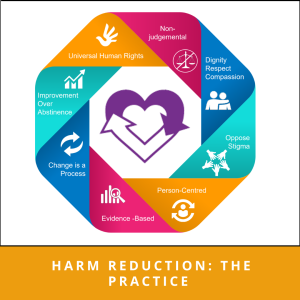Harm Reduction: The Practice

About this Training:
According to Dan Bigg, Director of the Chicago Recovery Alliance, the traditional approach to addiction support has been a focus on the “migration” of people from out-of-control addiction to another absolute of sobriety which, he says, is inconsistent with human behavior or the human condition. Harm Reduction shines a light on a fertile field of improvements between those two poles, or spectrum which can include each of them, that can be explored and supported in an individual’s journey of participant-driven recovery.
People experiencing homelessness are often engaged in addiction or other behaviors that may be in some degree essential to their survival or potentially exacerbating the negative impact of that state of homelessness. These things may have developed while experiencing homelessness or they may have existed prior to that. Helping people to discover and explore a wide range of alternatives for managing these things which help to prevent and/or reduce associated risks without the pressure to completely refrain.
| Instructor Led (In-person and virtual options) |
|
Training Audience: This training is appropriate for:
Training can be tailored according to attendees and the community or system involved. Note – The TTA requests that all training include at a minimum, one member of leadership from each organization/agency represented, be present as a learner. |
|
Training Length: In-Person (preferred): 1 day |
|
Training Capacity: In-Person: 40 maximum / 8 Minimum |
|
Training Objectives: In this training, participants will:
|
|
Training Prerequisite Onboarding Modules: Mandatory: None
|
|
Certificate of Completion: Through the TTA LMs, attendees will have the ability to receive a certificate of completion for the training . Attendees must be present for the full training to do so. To receive a certificate, attendees must complete and pass a final knowledge check/assessment (within 30 days post training).
|
|
Training Costs: Please inquire using the “Request More Info” button to the right regarding fees. Please note that all fees quoted should be considered an “all-inclusive” cost which means there would be not additionl costs for travel, prep, admin, or other items added to the rate provided to you with the exception of provincial tax. Members: A system, community, or organization can become a “Member” by purchasing an annual subscription to self-paced online onboarding modules. Discounts on live training are available determined by the subscription package chosen. (See “Onboarding Module” section here). |
This training will provide anyone in the homeless serving sector through policies, programs, and practices, with knowledge, tools, and empowerment to provide services consistent with harm reduction principles and strategies. It will incorporate person-centred and Housing First based approaches that reinforce choice, self-determination, and self-respect in those experiencing homelessness or are working to exit or remain in their new stable housed situation. Attendees will also be introduced to concrete knowledge and strategies for a variety of specific substances and other high-risk behaviors.
We will explore and learn the following topics.
-
- What is Harm Reduction? Terminology, definition and philosophy
- History of Harm Reduction
- Reducing associated stigma and dispelling myths
- Recovery Orientation
- Harm Reduction approaches
- Practicing Harm Reduction
